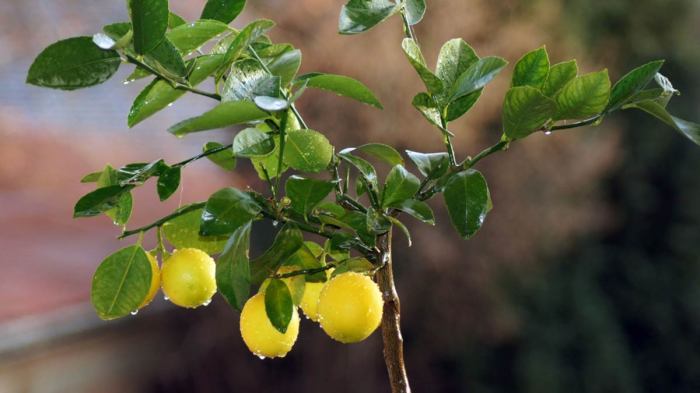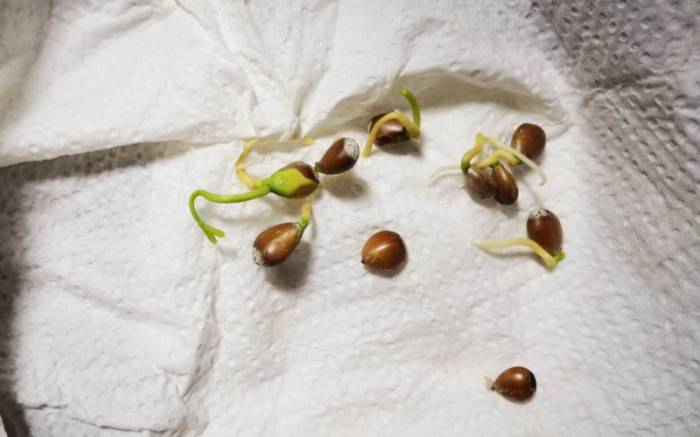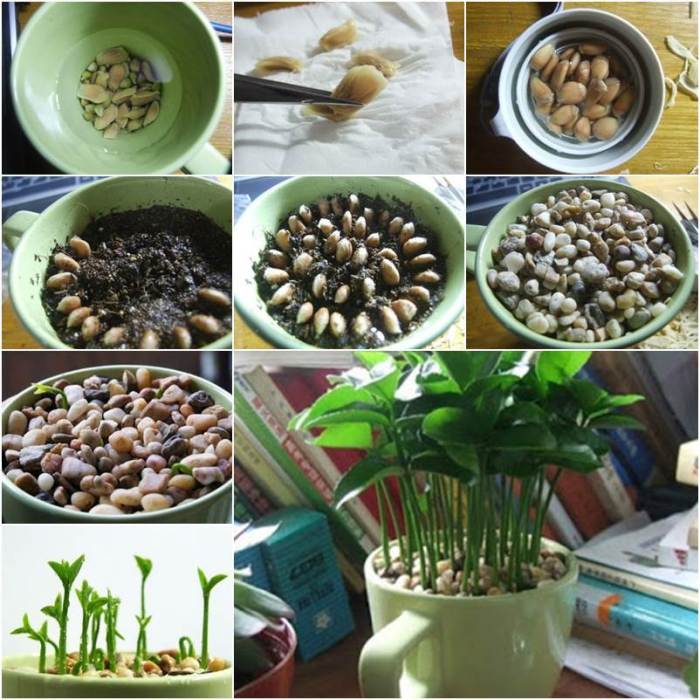Can You Plant a Lemon Seed?
Growing Lemon Trees from Seed: Can You Plant A Lemon Seed
Can you plant a lemon seed – Growing a lemon tree from seed is a rewarding but challenging endeavor. While not as straightforward as using cuttings, it offers the unique experience of nurturing a tree from its very beginning. This guide will explore the viability of lemon seeds, planting methods, environmental considerations, and the long-term care required to cultivate a healthy lemon tree.
Lemon Seed Viability, Can you plant a lemon seed

Source: herzindagi.info
The success of growing a lemon tree from seed hinges significantly on the viability of the seeds themselves. Several factors influence germination rates, including the seed’s origin, age, and storage conditions. Seeds from organically grown lemons generally exhibit higher viability compared to those from commercially produced lemons due to potential treatments used in commercial cultivation. Older seeds, or those improperly stored (exposed to excessive heat or moisture), are less likely to germinate.
Compared to other citrus fruits, lemon seeds show a relatively moderate germination rate. While some citrus seeds germinate readily, others have lower success rates. The exact figures vary greatly depending on the factors mentioned above. For example, some studies suggest a lower germination rate for lemon seeds compared to orange or grapefruit seeds.
| Lemon Variety | Germination Rate (%) | Factors Affecting Viability | Source |
|---|---|---|---|
| Eureka Lemon | 50-70% | Seed age, storage conditions | Estimated based on general observations |
| Lisbon Lemon | 40-60% | Seed maturity at harvest | Estimated based on general observations |
| Meyer Lemon | 60-80% | Seed source (organic vs. commercial) | Estimated based on general observations |
Planting Lemon Seeds: Methods and Procedures

Source: youhadmeatgardening.com
Three common methods for planting lemon seeds include direct sowing in soil, using seed starting mix, and employing paper towels for initial germination. Proper soil preparation and pot selection are crucial for successful germination and seedling development. Regardless of the chosen method, seed preparation is vital; this often involves cleaning the seeds to remove any pulp and potentially scarifying the seed coat (lightly scratching the surface) to aid water absorption and germination.
- Seed Preparation: Thoroughly clean the lemon seeds, removing any surrounding pulp. Gently rub the seeds with fine sandpaper to slightly scarify the outer coat, improving water absorption.
- Planting Method 1: Direct Sowing: Fill a small pot (4-inch diameter) with well-draining potting mix. Plant the seeds about ½ inch deep and water gently. Image: A small pot filled with potting mix, with a lemon seed gently placed in a small hole, then covered with soil.
- Planting Method 2: Seed Starting Mix: Sow the seeds in a seed starting tray filled with a moist seed starting mix. Cover the seeds lightly with the mix. Image: A seed starting tray with small compartments, each containing a lemon seed covered with a thin layer of seed starting mix.
- Planting Method 3: Paper Towel Germination: Place the seeds between two damp paper towels. Seal in a plastic bag and keep in a warm location. Once the seeds sprout, transplant them into individual pots. Image: Lemon seeds sandwiched between two moist paper towels inside a clear plastic bag. Tiny sprouts are visible on some seeds.
- Potting and Soil: Use well-draining potting mix to prevent root rot. Select pots with drainage holes to avoid waterlogging.
- Watering: Keep the soil consistently moist but not waterlogged. Allow the top inch of soil to dry slightly between waterings.
Environmental Factors and Seedling Care
Lemon seedlings thrive in warm, humid environments with ample sunlight. Consistent moisture is crucial, but overwatering should be avoided to prevent fungal diseases. Proper watering techniques involve allowing the soil to dry slightly between waterings, ensuring that the roots don’t sit in standing water. Common pests include aphids and spider mites; solutions include using insecticidal soap or neem oil.
Diseases like damping-off (a fungal disease affecting seedlings) can be prevented by using sterile potting mix and ensuring good air circulation.
Compared to other citrus seedlings, lemon seedlings have similar light and humidity requirements but might be slightly more sensitive to temperature fluctuations and overwatering. Regular monitoring for pests and diseases is essential for all citrus seedlings.
Growth and Development of Lemon Seedlings
Under ideal conditions, a lemon seed typically germinates within 2-4 weeks. The seedling will initially develop a taproot and then its first true leaves. A timeline for growth under ideal conditions is as follows: weeks 1-4: germination and taproot development; weeks 4-8: first true leaves emerge; weeks 8-12: continued leaf growth; weeks 12-24: more substantial growth and branching.
Nutritional needs vary depending on the growth stage. Initially, the seedling relies on the stored nutrients in the seed. As it grows, it requires regular fertilization with a balanced citrus fertilizer.
| Month | Height (cm) | Leaf Development |
|---|---|---|
| 1 | 2-5 | 1-2 leaves |
| 2 | 5-10 | 3-5 leaves |
| 3 | 10-15 | 5-8 leaves |
| 4 | 15-20 | 8-12 leaves |
| 5 | 20-25 | 12-16 leaves |
| 6 | 25-30 | 16+ leaves, possible branching |
Transplanting and Long-Term Care

Source: icreativeideas.com
Transplanting a lemon seedling involves carefully removing it from its initial pot and placing it in a larger container or directly into the ground. Choosing the right soil and pot size is crucial for healthy growth. Long-term care includes regular watering, fertilization, and pruning to maintain the tree’s shape and health. The care requirements for seedlings differ from mature trees primarily in terms of fertilization frequency and the need for protection from extreme weather conditions.
- Seedling Care: Frequent watering, regular fertilization with a diluted citrus fertilizer, protection from frost.
- Mature Tree Care: Less frequent watering (once the tree is established), regular fertilization (adjusting amounts based on the tree’s size and growth), pruning to maintain shape and fruit production.
FAQ Compilation
How long does it take for a lemon seed to germinate?
Germination can take anywhere from a few weeks to several months, depending on the seed’s viability and environmental conditions.
What type of soil is best for growing lemon seedlings?
Well-draining potting mix, slightly acidic (pH 6.0-6.5), is ideal. Avoid heavy clay soils.
Can I use store-bought lemons to grow a tree?
Yes, but the success rate is lower than with seeds from organically grown lemons. The seeds may be less viable due to processing.
How often should I water my lemon seedling?
Keep the soil consistently moist but not waterlogged. Water when the top inch of soil feels dry.
Yes, you can plant a lemon seed, though it’s a lengthy process to get fruit. Timing is crucial, much like determining the optimal planting time for other fruits; for instance, understanding when to plant watermelon seeds is equally important for a successful harvest. Check out this resource on when can you plant watermelon seeds to grasp the principles of seasonal planting.
Ultimately, successful cultivation of both lemons and watermelons hinges on proper timing and care.
Will my lemon tree from seed produce the same fruit as the parent lemon?
Not necessarily. Seed-grown lemon trees are often quite variable, and the fruit may differ in size, taste, and appearance.





















